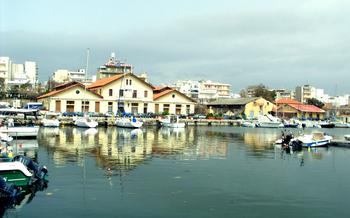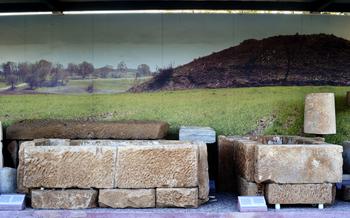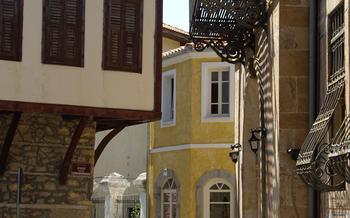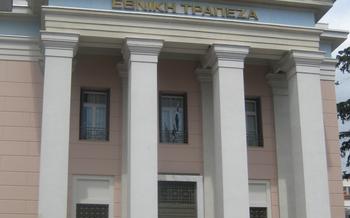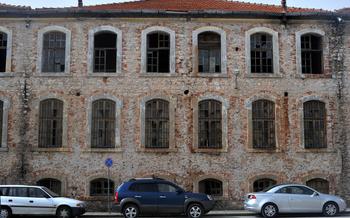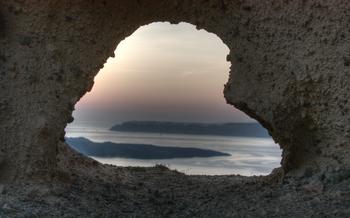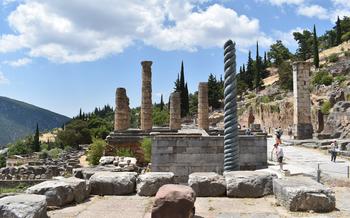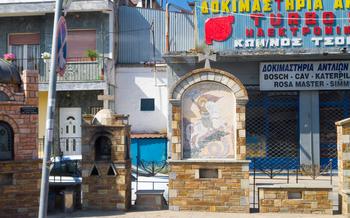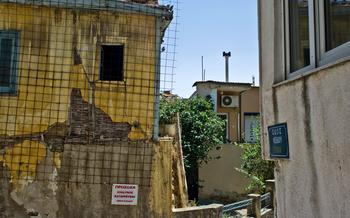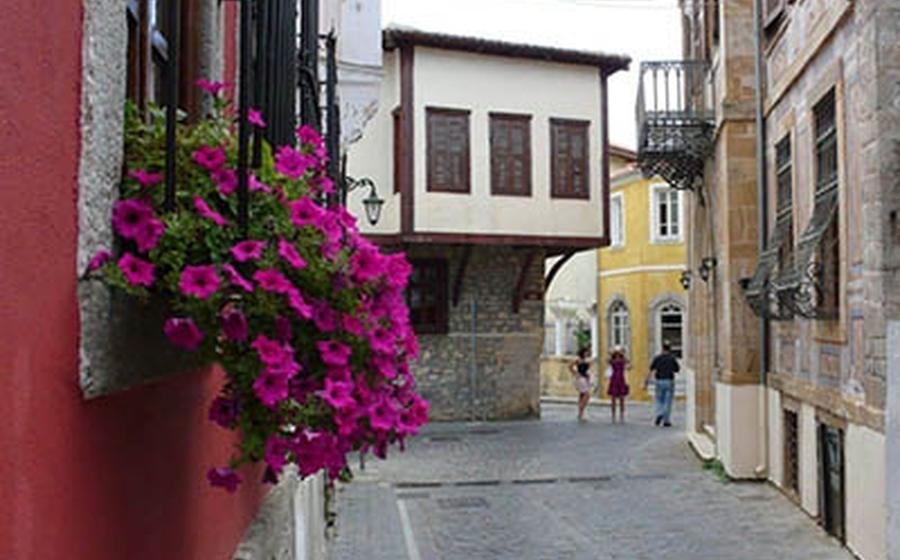
The Folklore Museum of Abdera
- The Folklore Museum of Abdera: A Journey Through History and Tradition
- Location and Accessibility
- Admission and Hours of Operation
- Exhibitions and Displays
- Traditional Costumes and Handicrafts
- Agricultural and Domestic Life
- Religious and Cultural Artifacts
- Music and Dance: Expressions of Greek Spirit
- Storytelling and Oral Traditions
- Local Crafts and Workshops
- Educational Programs and Activities
- Seasonal Events and Exhibitions
- Community Involvement and Volunteers
- Insider Tip: Hidden Gems
The Folklore Museum of Abdera: A Journey Through History and Tradition
The Folklore Museum of Abdera, nestled in the heart of the historic city of Xanthi, Greece, is a treasure trove of cultural heritage and traditions. Established in 1968, the museum stands as a testament to the rich history and vibrant folklore of the region. Its unique collection of artifacts, educational exhibits, and interactive displays offer visitors an immersive journey through the past, shedding light on the customs, beliefs, and way of life that have shaped this enchanting corner of Greece.
The museum's collection boasts an impressive array of traditional costumes, intricate embroidery, and handmade crafts, showcasing the exceptional artistry and craftsmanship of local artisans. These exhibits not only serve as a visual feast but also provide insights into the social and economic life of the past. The museum also houses a collection of agricultural tools, household items, and religious artifacts, offering a glimpse into the daily lives, beliefs, and rituals of the people who once inhabited this region.
Location and Accessibility
The Folklore Museum of Abdera is situated in the heart of the picturesque town of Abdera, in the region of Xanthi, Greece. It is conveniently located on El. Venizelou Street, making it easily accessible by foot, bicycle, or car. The museum's exact address is El. Venizelou 14, Abdera 670 01, Greece.
For those arriving by public transportation, several bus routes stop near the museum, providing easy access from various parts of the town. The closest bus stop is located just a few meters from the museum's entrance, offering a convenient option for visitors without their own transportation.
Ample parking is available in the vicinity of the museum, ensuring that visitors arriving by car can easily find a spot to leave their vehicles. Designated parking areas are clearly marked, providing a safe and organized space for visitors to park their cars.
The Folklore Museum of Abdera is committed to providing an accessible and inclusive environment for all visitors. The museum is wheelchair accessible, with ramps and elevators ensuring that all visitors can explore the exhibits comfortably. Additionally, the museum offers guided tours in sign language for visitors with hearing impairments.
Admission and Hours of Operation
The Folklore Museum of Abdera welcomes visitors with affordable admission fees, ensuring that cultural experiences are accessible to all. Adult tickets are priced at a reasonable 2 euros, while children and students can enter for a discounted rate of 1 euro. Special offers and group discounts are available for larger parties, making it an ideal destination for educational excursions or family outings.
Guided tours are offered at an additional cost of 5 euros per person, providing an immersive journey through the museum's captivating exhibits. Led by knowledgeable and passionate guides, these tours offer insights into the rich history and significance of the artifacts on display. Visitors can choose to embark on a guided tour or explore the museum at their own pace, immersing themselves in the captivating world of Greek folklore.
The museum maintains consistent operating hours throughout the week, welcoming visitors from Tuesday to Sunday between 9:00 AM and 3:00 PM. Closed on Mondays, the museum allows ample time for visitors to explore its treasures during the week and on weekends, catering to diverse schedules and ensuring that everyone has the opportunity to delve into the captivating world of Abdera's folklore.
Exhibitions and Displays
The Folklore Museum of Abdera is home to a diverse array of exhibitions and displays that provide a glimpse into the rich cultural heritage of the region. Divided into thematic sections, the museum showcases traditional costumes, handicrafts, agricultural and domestic life, religious artifacts, and more.
One of the highlights of the museum is the collection of traditional Greek costumes. These intricately embroidered garments represent the diverse regions of Greece and are a testament to the skill and artistry of local craftspeople. Visitors can admire the vibrant colors, intricate designs, and unique styles that make each costume a masterpiece.
The museum also features a section dedicated to traditional handicrafts and pottery. Here, visitors can learn about the techniques and materials used by local artisans to create beautiful handmade objects. From intricate weaving and embroidery to delicate pottery and ceramics, these exhibits showcase the creativity and craftsmanship that have been passed down through generations.
Another fascinating section of the museum focuses on agricultural and domestic life in the region. Visitors can explore exhibits that depict traditional farming practices, tools, and equipment. Household items, utensils, and furniture provide a glimpse into the daily lives of people in the past, offering insights into their customs, traditions, and way of life.
Finally, the museum houses a collection of religious icons, artifacts, and objects that reflect the deep religious traditions of the region. These include intricate carvings, paintings, and symbolic objects that hold cultural and spiritual significance for the local community. Visitors can learn about the beliefs, rituals, and festivals associated with these artifacts, gaining a deeper understanding of the region's religious heritage.
Traditional Costumes and Handicrafts
The Folklore Museum of Abdera houses a remarkable collection of traditional Greek costumes, offering a glimpse into the diverse cultural heritage of the region. Exquisitely embroidered dresses, intricate head coverings, and finely crafted accessories showcase the artistry and craftsmanship of local artisans. Visitors can admire the vibrant colors, intricate patterns, and unique designs that characterize these traditional garments, each representing a different region of Greece.
In addition to costumes, the museum also features a collection of handmade crafts and pottery, showcasing the skills and traditions of local artisans. Visitors can marvel at the delicate lacework, intricate wood carvings, and colorful pottery, all crafted with meticulous care and attention to detail. These items not only serve as decorative objects but also provide a tangible connection to the daily lives and traditions of the past.
To further enhance the visitor experience, the museum often organizes workshops and demonstrations of traditional techniques, allowing visitors to learn firsthand from skilled artisans. These workshops provide a unique opportunity to witness the intricate processes involved in creating these beautiful crafts and to appreciate the skill and dedication of the artisans who keep these traditions alive.
Agricultural and Domestic Life
The Folklore Museum of Abdera also delves into the agricultural and domestic life of the region, providing a glimpse into the traditional practices and tools used by the local people. Exhibits showcase various farming implements, such as plows, sickles, and threshing machines, highlighting the significance of agriculture in the community. Household items and utensils, like clay pots, wooden spoons, and woven baskets, offer insights into the daily lives of the past, showcasing the simplicity and functionality of traditional Greek households. These exhibits not only serve as historical artifacts but also shed light on the cultural context of rural Greece, emphasizing the strong connection between the land and its people.
Religious and Cultural Artifacts
The Folklore Museum of Abdera proudly houses a collection of religious icons and artifacts that provide a glimpse into the profound spiritual and cultural heritage of the region. These sacred objects, meticulously preserved and displayed, offer insights into the beliefs and traditions that have shaped the lives of local communities for generations.
Among the highlights of the collection are exquisite icons depicting saints, angels, and scenes from the Bible, each crafted with intricate detail and vibrant colors. These works of art serve as a testament to the skill and devotion of local artisans, who infused their creations with both artistic merit and deep religious significance.
Visitors can also explore a fascinating array of folkloric traditions and beliefs, represented through symbolic objects and artifacts. These items, ranging from amulets and talismans to votive offerings and ritual objects, shed light on the diverse spiritual practices and customs that have been passed down through generations.
The museum's collection of religious artifacts also delves into the symbolic significance of various objects in Greek culture. From the evil eye amulet, believed to ward off negative energy, to the intricate designs of traditional costumes, each item holds a deeper meaning, revealing the rich tapestry of beliefs and traditions that permeate Greek society.
Finally, the museum showcases rituals and festivals that are deeply rooted in the cultural fabric of the region. Through interactive displays and multimedia presentations, visitors can learn about the origins, customs, and significance of these celebrations, gaining a deeper appreciation for the vibrant cultural heritage of Xanthi and the surrounding area.
Music and Dance: Expressions of Greek Spirit
The Folklore Museum of Abdera not only showcases the material aspects of Greek culture but also delves into the vibrant world of music and dance. Traditional musical instruments, such as the bouzouki, lyre, and clarinet, are displayed, providing insights into their origins and significance. Visitors can learn about the unique scales and rhythms that characterize Greek music, which often reflects the emotions and experiences of the Greek people.
Folk dances, an integral part of Greek culture, are also highlighted at the museum. From the lively Kalamatianos to the soulful Tsamikos, these dances are deeply rooted in local traditions and celebrations. Visitors can witness performances by local dance groups or even participate in workshops to learn the steps and rhythms themselves. Through music and dance, the Folklore Museum of Abdera brings to life the vibrant spirit of Greek culture, inviting visitors to experience the joy and passion that define this Mediterranean nation.
Storytelling and Oral Traditions
The Folklore Museum of Abdera is not just a collection of artifacts; it's also a treasure trove of stories and oral traditions that have been passed down through generations. Visitors can delve into the rich tapestry of local legends, myths, and folktales, gaining insights into the beliefs and imaginations of the people who shaped this region.
Storytelling has always played a vital role in preserving cultural heritage, and the museum embraces this tradition with interactive storytelling sessions that bring the past to life. These sessions are not just entertaining; they also provide a unique opportunity for visitors to connect with the soul of Xanthi and its people.
In addition to listening to stories, visitors can also participate in workshops on the art of storytelling. These workshops offer a hands-on experience, teaching participants how to craft their own tales and share them with others. Whether you're a seasoned storyteller or a novice, these workshops are a wonderful way to immerse yourself in the oral tradition of Greece.
Local Crafts and Workshops
The Folklore Museum of Abdera is not just a place to admire artifacts from the past but also a vibrant center for promoting local crafts and traditions. Visitors can witness skilled artisans demonstrating their mastery in traditional crafts such as weaving, embroidery, pottery, and woodcarving. These artisans use time-honored techniques passed down from generation to generation to create beautiful and unique pieces.
In addition to demonstrations, the museum offers workshops where visitors can learn these crafts themselves. Under the guidance of experienced artisans, visitors can try their hand at weaving a colorful rug, embroidering a decorative cushion, throwing a clay pot on a potter's wheel, or carving intricate designs into wood. These workshops provide a hands-on experience that allows visitors to connect with the local culture and create their own unique souvenirs to take home.
By purchasing handmade crafts from the museum's gift shop or directly from the artisans, visitors can support local artisans and help preserve these traditional skills. This not only ensures the continuity of these crafts but also contributes to the economic well-being of the local community.
Educational Programs and Activities
The Folklore Museum of Abdera is not just a repository of artifacts; it is also a hub for education and cultural engagement. The museum offers a range of educational programs and activities designed to promote cultural awareness and appreciation, particularly among the younger generation.
School programs and workshops are organized to introduce children to the rich heritage of their region. Interactive learning experiences, storytelling sessions, and hands-on activities bring the exhibits to life, making history and tradition relatable and engaging for young minds.
Educational tours and activities are also available for groups of all ages. Guided tours provide in-depth insights into the museum's collection and the stories behind the artifacts. Interactive displays and multimedia presentations enhance the learning experience, making it both enjoyable and informative.
The museum recognizes that learning extends beyond the classroom walls. It offers workshops on traditional crafts, storytelling, and other aspects of Greek culture, allowing visitors to immerse themselves in the local heritage and gain hands-on experience. These workshops create a platform for cultural exchange and promote the preservation of traditional skills.
By offering a range of educational programs and activities, the Folklore Museum of Abdera plays a vital role in fostering cultural awareness, promoting intergenerational learning, and ensuring that the rich traditions of the region continue to thrive for generations to come.
Seasonal Events and Exhibitions
The Folklore Museum of Abdera is not just a static collection of artifacts but a dynamic space that hosts a variety of seasonal events and exhibitions throughout the year. These events aim to bring the museum's collection to life and provide visitors with a deeper understanding of Greek folklore and traditions.
During the summer months, the museum organizes traditional festivals and celebrations that showcase local customs and dances. Visitors can witness live performances of traditional music and dance, taste local delicacies, and participate in interactive workshops. These events offer a unique opportunity to experience the vibrant cultural heritage of the region and engage with the local community.
Additionally, the museum hosts special exhibitions that focus on specific aspects of Greek folklore or the history of Abdera. These exhibitions often feature rare artifacts, interactive displays, and educational materials that provide visitors with a comprehensive overview of a particular topic. By attending these seasonal events and exhibitions, visitors can gain a deeper appreciation for the rich cultural heritage of Greece and the unique traditions of the Xanthi region.
Community Involvement and Volunteers
The Folklore Museum of Abdera is not just a repository of artifacts; it is a vibrant hub where the community comes together to celebrate and preserve its rich cultural heritage. Visitors are encouraged to actively participate in this cultural exchange by volunteering their time and skills. The museum offers a variety of volunteer opportunities, ranging from assisting with educational programs to helping with research and documentation.
Volunteering at the Folklore Museum of Abdera is a rewarding experience that allows visitors to give back to the community while gaining invaluable insights into Greek culture and traditions. It is an opportunity to connect with locals, share stories, and make a meaningful contribution to the preservation of Greece's rich heritage.
Insider Tip: Hidden Gems
Beyond the main attractions, the Folklore Museum of Abdera holds secret spots and underrated exhibits that are waiting to be discovered. For those who venture off the beaten path, there are hidden treasures to be found. One such gem is a small room tucked away in a corner of the museum, where visitors can find a collection of antique musical instruments that have been lovingly restored. Another hidden gem is a display of traditional Greek shadow puppets, which are used to tell stories and legends. Visitors can also find a collection of old photographs that offer a glimpse into the lives of the people of Abdera in the past. These hidden gems add an extra layer of depth and charm to the museum experience, and they are sure to delight visitors who are looking for something truly special.
